|
8 Clarence Place
Dover
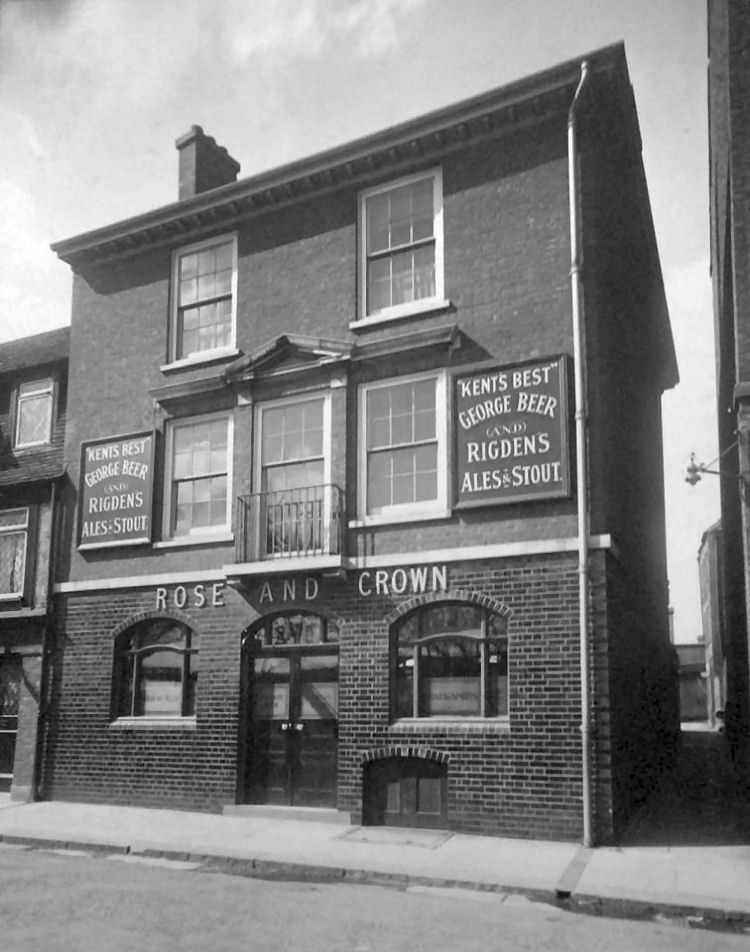
Above photo supplied by Lisa Hudson, circa 1926. |
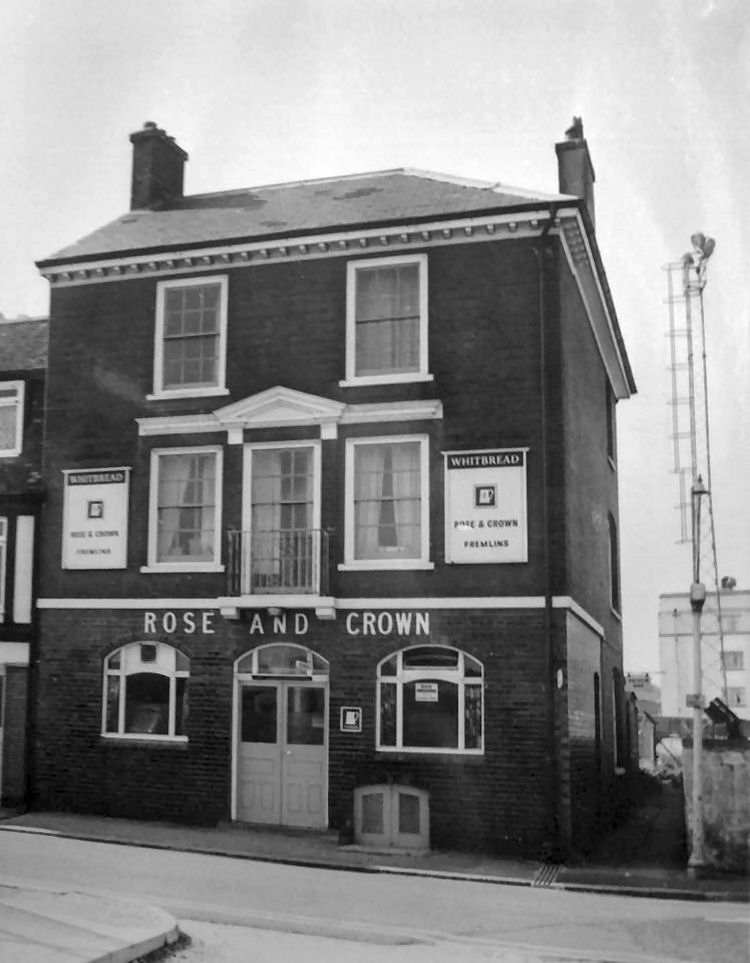
Above photo supplied by John Gilham, 1974. |
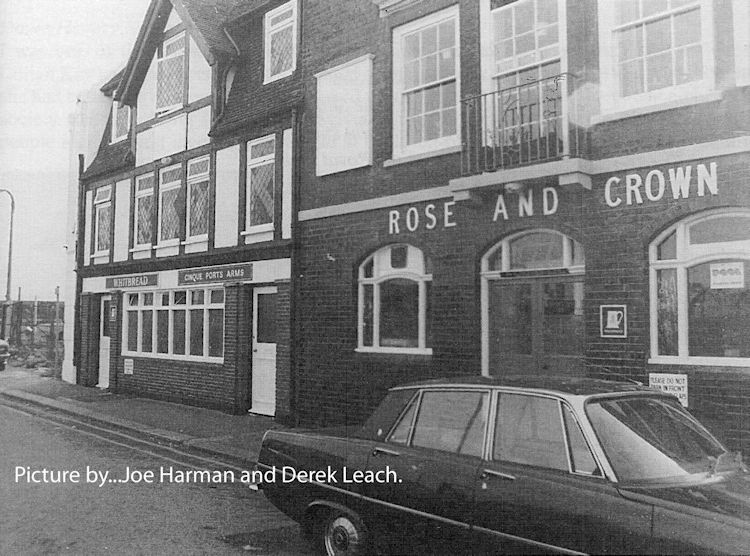
Above photo, circa 1980. Also showing the "Cinque Ports." |
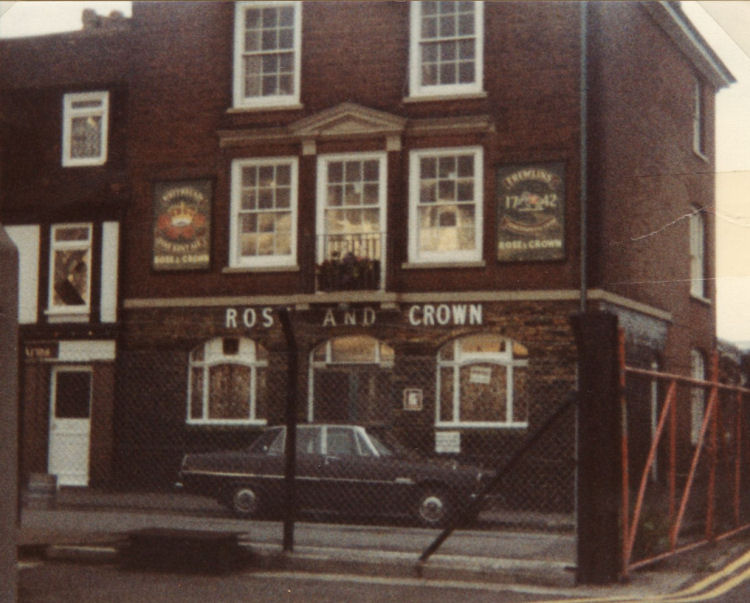
Above photos circa 1980 by Barry Smith. |
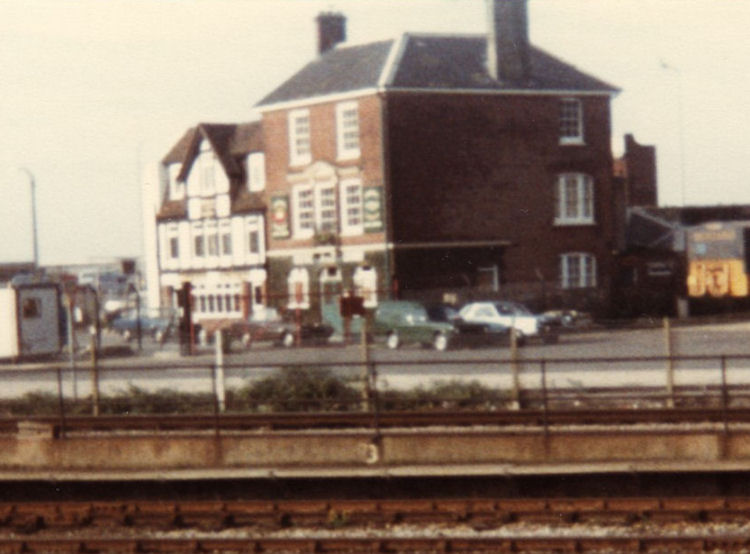
Above photos circa 1980 by Barry Smith. |
The property shows on maps of 1624 but it is not known when it first
entered the trade. It was selling liquor by 1841 and it opened at four a.m.
in 1872 and three thirty a.m. from 1874. It was one of the few pubs allowed
to continue with that concession after 1900. (But possibly five a.m. then).
|
From the Dover Telegraph and Cinque Ports General
Advertiser, Saturday 15 July, 1837. Price 7d.
CORONER'S INQUEST
SUICIDE BY A STRANGER
An inquest was held yesterday at the "Rose and Crown," South Pier,
before G. T. Thompson, Esq., Coroner for Dover ad the liberties of the
Port, on the body of a man, name unknown, who committed suicide by
hanging himself in his bed-room, at the above house. He arrived there on
Tuesday, and by circumstances which transpired in evidence, it seems he
came from London, by way of Herne Bay. He had stated himself to be a
shoemaker out of work and to one of the witnesses, who had mentioned
some of the eastern parts of London to him, he said he came from the
other end of the town. He appeared about four and thirty years of age,
five feet seven inches in height; was slightly made; his hair, whiskers,
and complexion dark, and nose remarkably prominent. His dress was a
brown dress coat, with velvet collar; black trousers and a buff
waistcoat, sprigged with purple, and bound with black. The maker's name
in his hat, "Marks, 30, High Street, Bloomsbury." He had also a pair of
Wellington boots that had been vamped, the original parts marked, "La
Hogue, Boulogne." No other marks appeared on his clothing. He had no
luggage or papers. In his pockets were found seventeen shillings and
sixpence, a key, and some halfpence.
The evidence of the landlord and others, proved that the
deceased had been unwell and dispirited - that on retiring on Thursday
night, he said he should have no rest until morning when he should have
a long and comfortable sleep. The witness receiving no answer when he
knocked at the door of deceased's room yesterday morning, called in
assistance and forced the lock, when they found the unfortunate man on
his knees by the side of his bed, having his arms crossed, and as if in
the position of prayer. His head was suspended from the tester by a silk
handkerchief, which they instantly cut, and medical assistance was
obtained; but he was quite dead. The other evidence was merely
corroborative of the above, and to prove the indisposition of the
deceased, who on one occasion said to the landlady on retiring, 'what a
blessing it would be if I should never rise any more!'
Verdict, temporary insanity.
|
|
From the Kentish Gazette, 12 September 1837.
Suicide.
Friday se’nnight. an inquest was held before C. T. Thompson, Esq.
coroner for Dover, and a respectable jury, at the "Rose and
Crown" public-house, on the body of a man, name unknown, who committed
suicide by hanging himself by a silk handkerchief, to
the tester of the bed he occupied at the same house, late on Thursday
night or early on Friday morning. From the evidence, it
appeared that the deceased had come from London by a Herne Bay steamer,
and walked to Dover on Tuesday evening. He
appeared to be about 25, wore a brown surtout coat, light waistcoat, and
had on boots with the maker’s name, resident at
Boulogne, stamped inside. The name "Farrier" was also written inside the
boots, which was understood to be the name of the
deceased.
Verdict:— "Committed suicide whilst labouring under temporary insanity."
|
|
From the Dover Telegraph and Cinque Ports General
Advertiser, Saturday 17 April, 1841. Price 5d.
DOVER POLICE COURT
William Lawrence, labourer, aged 20, charged with stealing at Dover,
40 pounds of beef, the property of Joseph Sacre, who stated that on the
evening of the 10th of January last, he missed a four quarter of beef,
which had been hanging in front of his shop. The beef was a few days
afterwards produced by a policeman, which was cut up into five pieces,
but he identified it, by some marks, as his property.
Hogben, landlord of the "Rose and Crown," stated that prisoner lodged
at his house. On the evening of the 14th January he went into prisoner's
bed-room, and under the bed found a quantity of beef, which was owned by
Mr. Sacre. There was another bed in the room, in which no person had
slept for some weeks past.
Edward George Corrall, superintendent of police, was with the last
witness when the beef was found. He went the same evening, accompanied
by Sergeant Laker, to the "Horse and Jocky," where he apprehended the
prisoner. There were several woman in the room, behind whom he was
concealed in the corner. The jury after some consultation returned a
verdict of Not Guilty. The Court being satisfied that the beef was the
property of Mr. Sacre, it was given up to him.
|
|
From the Dover Telegraph and Cinque Ports General Advertiser, Saturday, 10 July, 1847. Price 5d.
CORONER'S INQUEST
On Saturday evening last an inquest was held at the “Rose and Crown
Inn,” before G. T. Thompson, Esq., Coroner for the Borough, on the body
of William Hogben, aged 33, fly-proprietor. The Jury having been sworn,
and a foreman appointed, they then proceeded to view the body, and on
their return the following evidence was given:-
William Henry Dray: I am a mariner belonging to the Ranger revenue
cruiser. On Sunday, the 13th of June, I, with two of my comrades, and
five females of our acquaintance, hired the deceased William Hogben and
his fly for a pleasure excursion. We left Dover at a quarter-past three
o'clock in the afternoon, and went first to River. We stopped at the
“Dublin Man-of War” for about two minutes, and then stared for Mongeham.
One of the horses drawing the fly refused to move, we put up at the
“Three Cups,” while Hogben returned to Dover for the purpose of getting
another horse, taking the refractory one with him. When he returned, we
started for Mongeham, where we arrived about half-past six. The party
had tea there, and a pot of beer, staying about two hours, and then
started for Deal. At Deal we remained some short time, and had some gin
and water. We left Deal at nine, the deceased driving; two of the party,
of whom I was one, accompanied the box seat with deceased, the females
and one of my comrades being inside. On our way to Dover we stopped at
Ringwould, and had some more gin and water. We did not stop again; on
coming to the Castle Hill the deceased did not skid the wheel; but when
about half way down, having then nearly been capsized, he put the skid
on. Hogben had jumped off previous to that, but said he was not hurt.
After the skid was on, the deceased took the reins. When near the bottom
of the hill, the carriage appeared to overpower the horses, and they
went fast. At the entrance to castle Street, the carriage overturned; I
was thrown off, and on recovering myself (in a minute or two after) I
ran to the fly to assist the females. I did not see the deceased then,
and having got the females out, I heard someone say there was a man
under the fly; I found that it was the deceased, and I helped to get him
out. It seemed to me that the box of the fly was rested upon him. He was
insensible when we got him out, and his face was covered with blood; but
his consciousness returned in five or ten minutes, and then he was
assisted to Mr. Jones's surgery. Mr. Jones was at home, and attended
upon him. I don't know how the fly was upset. The deceased was quite
sober, and I am not aware of his having taken any drink during the day,
except a portion of that which we had brought for ourselves. Neither I
nor my comrades touched the reins at the time of the accident.
Edward Jones, surgeon, residing in Castle Street: On Sunday fortnight, a
little before eleven, I attended the deceased at my house. I had gone
out into the street, hearing a great noise, and there saw a fly upset in
the road, and the deceased lying upon his back, with part of the
carriage or the haunch of one of the horses resting upon him; on getting
him to my house, and washing away the blood which covered his face, I
observed upon it several lacerations; there was one nearly three inches
long, and very deep, under the right eye. He did not complain of being
hurt anywhere else. Having dressed his wounds, I took him to his
residence, and attended him professionally afterwards. In two or three
days he complained of pain in the upper part of the right thigh and the
lower part of the belly. On an examination, I found a most extensive
bruise; and in a few days more mortification threatened to set in, which
I treated with success by incision, producing a separation of the parts.
The wound put on a healthy character, and he promised well. On Sunday
morning haemorrhage set in, and continued during the day, so as to alarm
me. I subdued that, and up to Tuesday last he appeared to mend. On
Wednesday last, on seeing him, I found incipient lock-jaw coming on,
which continued to increase until Thursday night, the first instant,
when he died. I believe his age to have been 33 years. The attack of
lock-jaw was the consequence of injuries he had received when I first
saw him.
The above forming the whole of the evidence, the Coroner then summed up,
and after a short consultation the Jury returned the following verdict:-
That the deceased died from injuries by the accidental overturning of a
carriage, which he himself was driving.
|
|
From the Dover Telegraph and Cinque Ports General
Advertiser, Saturday 11 March, 1848. Price 5d.
CORONER'S INQUEST
An inquest was held on Monday, at the "Rose and Crown," Clarence
Place, before G. T. Thompson, Esq., Coroner, on the body of Samuel
Perry, aged 33, a commissioned boatman, under the command of Lieut.
Pearson, of the Coast Guard service, who died suddenly on Sunday
morning.
Joseph Howlett, commissioned boatman in Coast Guard services deposed:
On Sunday night last, I was on duty with deceased in the boat, in Dover
Harbour. About 11 o'clock, we took off Mr. Morgan to the Lion Cutter,
lying in the bay. On reaching the cutter, deceased held on a rope while
Mr. Morgan got on board, and on turning round, I saw deceased had fallen
across the gunwale of the boat. I went to him and unloosed his neckcloth,
and he appeared quite lifeless. The galley belonging to the Lion was
immediately lowered, in which deceased was placed and rowed o shore, and
I went to call Mr. Coleman. Deceased had been on this station about
three months, during which time he had never complained of illness, and
on the night in question he appeared more cheerful than usual.
Macdonald Wallis, assistant to Mr. Coleman, surgeon, deposed: About
two months since I met deceased on a Sunday afternoon at the back of the
Railway terminus, and in course of conversation, he complained to me of
certain symptoms, which induced me to think he was labouring under a
disease of the heart. I cautioned him against using any violent
exercise, saying, if he did so, he might some day die suddenly.
John Coleman, jun., surgeon, deposed: I was called on Saturday night,
about 12 o'clock, to see deceased. I opened a vein, but found life quite
extinct. From the suddenness of the death, and the peculiar froth around
the mouth, as well as the evidence of the last witness, I judge that
death arose from pulmonary apoplexy, arising from disease of the heart.
Verdict: "Died by the visitation of God."
|
|
From the Dover Telegraph and Cinque Ports General
Advertiser, Saturday 1 June, 1850. Price 5d.
CORONER'S INQUEST
On Tuesday evening at half-past seven o'clock, an inquest was held at
the "Rose and Crown," at the pier, before G. T. Thompson, Esq., Coroner
for the Borough, on the body of George Norton, aged 37 years, one of the
men employed with the "mud barges" in over harbour, who met with his
death by falling overboard in the morning of that day. Mr. Joseph Long
was appointed foreman for the jury, and the body, which was lying at the
Boom-house, having been received, the following was taken:-
William Reffell, labourer in the employ of the Commissioners of Dover
Harbour - I knew deceased, who was employed in the same barge with me.
This morning, at about a quarter past 9 o'clock, we were in the barge
together, opposite to the Boom-house, and were in the cat of warping her
over to the other side. The warp had already been made fast, and the
deceased, with it in his hands, was walking backwards to pass the rope
over the timber head at the stern of the barge. I was standing at the
bow, and on turning round to see how he was getting on I saw him in the
act of falling overboard. I ran to his assistance, with a view of
throwing him a rope; but the only one I could get was the one he had
previously held in his hands, and that was drawn so tight by the stream
of the tide that I could not get it to reach him. I looked out for
something else, but before I could get a plank to throw to him he had
sunk. The boat which had crossed with the rope then came up, and the man
in it ran to the bow of the boat, but could not reach deceased. In about
20 minutes from the time of the accident another boat came to the spot,
and the men in it succeeded in picking up the deceased, who was then
taken to the Boom-house. I do not know what was the depth of water at
the time - I should think not about 5 or 6 feet, as a signal had just
been hoisted for a steamer to enter. Deceased did not attempt to swim.
John Martin, mariner - On hearing the cry this morning that a man was
overboard, I ran for the Humane Society's drag, which with myself and
two other sailors entered a boat near the Boom-house, and forthwith cast
out the drag, but at the first haul found nothing. We then dragged at
the spot where the man had sunk, and brought him up. Deceased was soon
landed, and taken to the Boom-house. From the time that I heard the
alarm till deceased was picked up I should think 25 minutes had elapsed.
I judged there was about 5½ feet of water in
the harbour at the time. There was a strong tide running.
William Johnson, working in the harbour - I assisted in carrying the
deceased this morning to the Boom-house, and was present during the
whole time the usual means of restoration were going on. Two medical men
were in attendance - Mr. Coleman's assistant, and a physician staying at
the "King's head Hotel." The attempts to re-animate deceased commenced
at about 10 o'clock, and were continued till about a quarter past one,
but without success.
This forming the whole of the evidence, the Coroner summed up, and
the jury returned a verdict of "Accidentally Drowned," and suggested
that a recommendation be forwarded to the harbour master for providing
an additional rope to the barges, for services in any cases of accident
that might again occur.
|
|
From the Dover Express and East Kent Intelligencer, 2 April, 1859.
DRUNK AND DISORDERLY
Stephen Gilham, a powerful labourer, was being charged with being
drunk and disorderly early the same morning, and with assaulting Sarah
Ann Cheney, under the following circumstances.
Sarah Ann Cheney said - My husband is the landlord of the "Rose and
Crown," in Clarence Place, and this morning between three and four, the
defendant and a friend came to my house and asked for some beer, and
then for some coffee. I served him and his friend with a quart of beer,
for which they paid. He afterwards asked for some coffee, and I sent him
a cup, charging him 1½d. for it, when he
refused to pay but a penny. I then sent my servant to fetch the coffee
back, when he struck me with his fist, at the same time using very bad
language, and, therefore gave him in charge.
William Richardson, in the employ of Mr. Churelward, said he lodged
at the house of the complainant. He heard the defendant abuse the
complainant, and on his interfering, the defendant abused him too. After
the defendant had left the house, he saw the complainant put her hand up
to prevent him coming back again. He saw the defendant strike Mrs.
Chorley twice; but the third time he interfered, or the complainant
would have suffered much worse.
Defendant said the complainant assaulted him first by pushing him out
of the chair in the coffee house when he was asleep, and by afterwards
striking him.
The Magistrates said, that as the defendant had several times
previously appeared before them, they should fine him 10s., and 7s.
costs; or commit him to gaol for a fortnight, with hard labour.
|
|
From the Dover Express and East Kent Intelligencer,
25 January, 1867.
THE REMANDED CHARGE OF BURGLARY
James Hickey and George Wilson, the men remanded from Saturday, on a
charge of burglariously entering the shop of Mr. Moody, St. James's
Lane, were again placed at the bar, the police being prepared with
further evidence, and also with evidence to rebut the prisoners'
statement, that they were drinking all the night of the robbery at the
"Rose and Crown."
James Horn: I live at Prospect Place Cottages, and am a mariner. I
was at the "Rose and Crown" last Friday morning, between five and
half-past five o'clock. The soldier and other prisoner were there
together; and the soldier offered me a pair of boots for sale. The pair
of boots produced are the same. I left the "Rose and Crown," but shortly
afterwards came in again, and the other prisoners then had the boots i
his hand, offering them for sale to a navvy who was going snow digging
and who was tipsy. Wilson asked 1s. 6d. for the boots, or 2s. 6d. for
two pairs - this, and a pair of bluchers.
The witness, in cross-examination by the prisoner Hickey spoke
positively as to his identity.
Emily Goodbun: I am daughter of the landlord of the "Rose and Crown."
The two prisoners came into my father's house at half-past three o'clock
on Friday morning. I had not seen them before during the night. They
went into the front room, and I did not see them again.
The prisoner, who repeated that they were innocent of the robbery,
were committed for trial at the next Maidstone Assizes.
|
|
From the Dover Express and East Kent Intelligencer,
25 January, 1867.
DASTARDLY ASSAULT
Ambrose Poynter, a fly-driver, was charged with assaulting and
threatening Mr. Charles Goodbun, the landlord of the "Rose and Crown
Inn," Clarence Place.
The complainant said he was in the habit of keeping his house open
at night for the accommodation of the travelling public; and the
defendant had repeatedly come in, very early in the morning, and, after
refreshing himself with half a pint of beer, had gone to sleep in the
taproom. The defendant, however, was at times very quarrelsome, and
would then use disgusting language and indulge in violent threats. The
same morning he came into the house, and after threatening what he would
do, he kicked witness in a most unmanly way and dastardly manner.
He was still suffering great pain from the injury the prisoner
inflicted, and he went in bodily fear of him.
The prisoner flatly denied that he had indulged in the threats
referred to, or that he had committed the assault; but the Magistrates
did not believe him, and fined him 40s. and the costs for the assault,
or one month's imprisonment.
The prisoner said he must go to prison; and he was then informed
that, when the term of his imprisonment had expired, he would be called
upon to find sureties to keep the peace towards Mr. Goodbun for the
space of six months.
|
|
From the Dover Express and East Kent Intelligencer, 6 September, 1872. Price 1d.
ANNUAL LICENSING MEETING
APPLICATION FOR EXTENSION OF TIME
Mr. Worsfold Mowll made an application on behalf of Mrs. Goodban,
the landlady of the “Rose and Crown,” a house adjoining the “Cinque
Ports Arms,” for the extension of the hours during which his house might
remain open, under the 26th section of the Act, which gave the
Magistrates power to grant special licenses for the convenience of
markets, theatres, or those “following any lawing trade or calling.”
|
|
From the Dover Express and East Kent News, Friday 23 August, 1878
SMUGGLING
Benjamin Burville, Richard Betts, and William irons, hovellers, were
charged with having concealed on a galley punt, named the Fox, 3½lbs. of
foreign manufactured tobacco liable to fortitude.
Rober Alfred Wittingetall said: I am an acting examining officer of
Customs. About a quarter to six this morning, I was by the steps of the
Crosswall-quay with an out-door officer named Richard Hinkley, when the
galley-punt Fox came into the Harbour, rowed by the three defendants,
with a pilot on board. The pilot landed and the defendants went to the
“Rose and Crown” public-house. I then directed Hinkley to search the
boat, and the 3½lbs. of foreign tobacco produced was found in the stern
of the boat. I then went to the public-house and fetched the defendants
and asked them if the tobacco belonged to them, each admitted that it
did. They said they got it in payment for posting a letter for the
captain of the vessel where they had brought the pilot from. The single
value and duty of the tobacco is 18s. 8d.
By the Bench: I have never had any reason to suspect these men before.
The tobacco was covered up in the usual form. There was no concealment.
Defendants were fined each the single value and duty, 18s. 8d.; and the
costs 5s., in default 14 days' imprisonment.
The money was paid.
|
|
From the Dover Express and East Kent News, Friday, 28 August, 1891. Price 1d.
DOVER LICENSING SESSIONS
THE ROSE AND CROWN
The owner of this house was summoned on the 13th of March, 1891, charged
with serving liquor to a drunken person, but the case was dismissed,
nevertheless, the owner was called up and cautioned to be more careful
in the future.
[Sotto Voce In law, "sotto voce" on a transcript indicates a
conversation heard below the hearing of the court reporter. (from the
Solicitor's Bench), not guilty, but don't do it again!]
|
By 1909 the front of the building was in danger of collapse and a
re-frontage operation was performed. It proved to be a temporary solution
because ten years later, other plans called for the practical rebuilding of
the whole. From all accounts that was quite an achievement. Its neighbour,
"The Cinque Ports Arms" was of a like age and was in danger of collapse
whilst the work proceeded. The exercise apparently called for perfect timing
and execution.
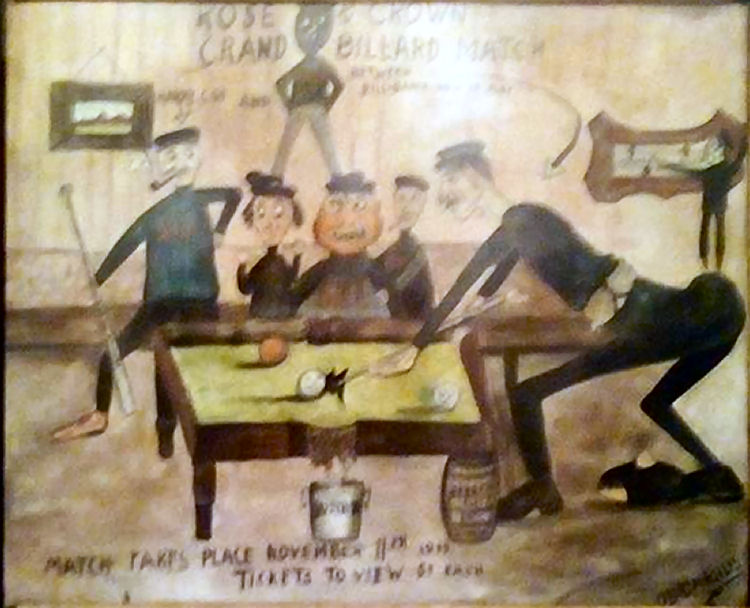
Above watercolour showing a billiard match 11th November 1919 signed Os'carius, between Harry Coe and Bill Banks. It was stated the match was drawn
after Bill Banks ripped the baize.
|
|
From the Dover Express and East Kent News, Friday, 15 May, 1922. Price 1½d.
THE ROSE AND CROWN RATING CASE
At the Dover Police Court on Monday, before Messrs. W. B. Brett (in the
chair) and J. H. Back.
The case of the rate arrears of the “Rose and Crown” was mentioned.
Mr. Birch said that this case was adjourned a fortnight ago, on the
application of Mr. Arrowsmith, for the purpose of an appeal being
considered. The matter had come before the Assessment Committees and the
assessment was confirmed. He asked for an order forthwith in this case,
and, should the case go to the Quarter Sessions, that was not
justification for non-payment, for a refund could only be obtained.
Mr. Arrowsmith said he took that opportunity of giving Mr. Birch a copy
of his appeal to the Quarter Sessions. He had already enlarged the
points previously, but under the Poor Rates Act of 1801 proceedings
could only be taken for the recovery of the assessment at the rate
defendant was assessed in the last effective rate, provided there was an
appeal pending. In this case there was an appeal pending, and
consequently, the only order which could be asked for was for payment on
the rate on the basis of the last effective rate. They had paid the
rate.
Mr. Birch. No, sir.
Mr. Arrowsmith: All right, it is going to be now (and the cheque was
handed over). He said he thought the fairest way would be to adjourn the
case until a fortnight after the Quarter Sessions, which he understood
would be held on July 6th, by which time it would be settled one way or
another. The amount outstanding was trivial now that the rate had been
paid on the old basis.
The Magistrates' Clerk: have you anything to say, Mr. Birch?
Mr. Birch said the amount now outstanding was £22, approximately. In
view of the fact that the rate had been paid on the old assessment, he
thought it was the only course to adopt.
The Bench adjourned the case until July 17th.
|
Further plans for alterations were approved in 1928 but I have no
details.
It wasn't until 1950 that the licence was transferred to "full" allowing
the sale of beers and spirits.
|
Dover Express, Friday 22 September 1939.
Breaches of Blackout Rules.
Joseph Smith, "Rose and Crown," Clarence Place, pleaded guilty to
showing a light at 10:55 p.m. on September 3rd.
Chief Inspector Saddleton said that P.C. Butler and Special Constable
Smissen were on the Viaduct, and saw a light in the kitchen at the rear
of the "Rose and Crown." They saw defendant, who said that he was having
his supper, and told him it must be put out at once. Ten minutes later
the light was still visible from the viaduct, and the officer again saw
defendant, who said, "We are having trouble with the baby." They heard
no baby crying.
Defendant was fined £1.
|
|
From the Dover Express and East Kent News, Friday, 21
March, 1952.
Punches Follow Pints
Two men who were said to have exchanged blows after first exchanging
words outside the "Rose and Crown" were advised to keep away from each
other in the future when they appeared before Dover Magistrates on
Monday on assault charges.
Bernard William Dillon, of 15, Seven Star Street Flats, denied a
change of assaulting Cecil Edward Dalton, of 4, Last Lane, who, in his
turn, denied assaulting Dillon.
After hearing evidence of a scene outside the public house
where each man was said to have struck the other, the Chairman (Mr. D.
Bradley) said the bench had decided to dismiss the summons in each case.
|
As a matter of interest, and still present as I retype in 1989, but now
only a blind alley, is the passage alongside the pub which once led to
Middle Row in the old pier district.
This was damaged by enemy action early in world war two but was repaired
and made operational again by January 1941. That was a rare distinction
indeed and certainly the only case in the town that I know of.
A past outlet of Rigden and Company, Faversham, which passed to the
Whitbread group. It closed in 1986 and remained boarded up and derelict to
1988 when it was renovated and integrated with the "Cinque Ports Arms".
|
From an email received 25 September 2010
Thomas Cheney was Sarah Ann's first husband. In 1851 Census Thomas and Sarah
Cheney lived in Sussex. Thomas's occupation was a coachman. In the 1861
Census Thomas Cheney was the Victualler in Clarence Place, Dover. Sarah
Ann Cheney was there too.
In 1861 Thomas Cheney died. (Death record - Thomas Cheney, Quarter
October November December, 1861, Dover, Volume 2a, page 439.
Sarah Ann Cheney married William Johnson in Dover in 1870. (Their
marriage record - Sarah Ann Cheney, William Johnson, Quarter
October, November, December, Year 1870, Registered Dover, Volume 2a,
page 1431).
Regards,
Julie Smith.
|
|
From the Dover Express and East Kent Intelligencer,
10 February, 1871. Price 1d.
TRANSFER OF LICENSE
Mrs. Chaney, the landlady of the "Rose and Crown," having recently
re-married, applied for transfer of license to her husband, Mr. Johnson,
and the application was granted.
|
|
From the Dover Express and East Kent News, Friday, 6 September, 1874. Price 1d.
ANNUAL LICENSING MEETING
TWO HOUSES
The Magistrates refused to grant the renewal of the license of the “Rose
and Crown” to William Johnson, as he was also the keeper of the
“Swingate Inn,” Deal Road.
|
LICENSEE LIST
HOGBEN/HOGBIN William 1841-47 (age 50 in 1841 )
( )
( Hogbens) Hogbens)
HOGBEN Mrs Susan 1848-51+ (age 59 in 1851 ) )
BURROWS Henry 1854
CHENEY Thomas 1859-61 dec'd (age 34 in 1861 ) )
CHENEY Miss Sarah Ann 1861-Feb/71
JOHNSON William Feb/1871-Feb/78

  (
( wife ne CHENEY Sarah Ann)
wife ne CHENEY Sarah Ann)
GOODBUN Charles 1863-67+ ?
GOODBUN Elizabeth 1871+ (widow age 47 in 1871 ) )
HENNESSEY J 1874?
GOODBUN Mrs Elizabeth 1874-Oct/85 (age 56 in 1881 ) )
  
CONNOR Edward Oct/1885-1903 (age 54 in 1901 ) )
  ( (  Out of date info?)(Conner was for some years deputy Master of Porters)
Out of date info?)(Conner was for some years deputy Master of Porters)
KEMP Sidney John 1901-1916 dec'd (age 30 in 1901 ) )
  
KEMP Mrs 1916-Jan/17

WRIGHT Thomas Jan/1917-22+
  of Folkestone
of Folkestone
PEARSON Charles Vaschell 1923-26 end

MIELL George Frederick 1926-28 end
 BALSOM John 1928-32+ (
BALSOM John 1928-32+ ( BATSOM) BATSOM)
HARRIS James K W T 1937 end
MARTIN W 1937-38 end and 1941
SMITH Joseph 1938-50+
   
COOPER William Frederick H 1952-53+


TERRY Albert W 1956-66
STEVENS L late 1960's
GILHAM Ronald G 1972-84 end

 Whitbread Fremlins
Whitbread Fremlins
 From Wingham Division Ale Licences 1740 Ref: KAO - QRLV 3/1 From Wingham Division Ale Licences 1740 Ref: KAO - QRLV 3/1
 From Bagshaw Directory 1847 From Bagshaw Directory 1847
 From the Post Office Directory 1874 From the Post Office Directory 1874
 From the Post Office Directory 1882 From the Post Office Directory 1882
 From Pikes Dover Blue Book 1895 From Pikes Dover Blue Book 1895
 From the Kelly's Directory 1899 From the Kelly's Directory 1899
 From the Post Office Directory 1901 From the Post Office Directory 1901
 From the Post Office Directory 1903 From the Post Office Directory 1903
 From the Kelly's Directory 1903 From the Kelly's Directory 1903
 From Pikes Dover Blue Book 1909 From Pikes Dover Blue Book 1909
 From the Post Office Directory 1913 From the Post Office Directory 1913
 From the Post Office Directory 1922 From the Post Office Directory 1922
 From Pikes Dover Blue Book 1924 From Pikes Dover Blue Book 1924
 From the Post Office Directory 1930 From the Post Office Directory 1930
 From Pikes Dover Blue Book 1932-33 From Pikes Dover Blue Book 1932-33
 From the Post Office Directory 1938 From the Post Office Directory 1938
 From Pikes Dover Blue Book 1938-39 From Pikes Dover Blue Book 1938-39
 From Pikes Dover Blue Book 1948-49 From Pikes Dover Blue Book 1948-49
 From the Kelly's Directory 1950 From the Kelly's Directory 1950
 From the Kelly's Directory 1953 From the Kelly's Directory 1953
 Library archives 1974 Library archives 1974
 Census Census
|





